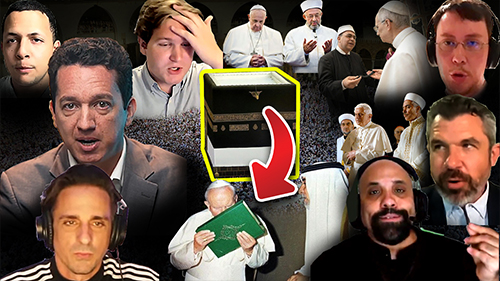| Recent Featured Videos and Articles | Eastern “Orthodoxy” Refuted | How To Avoid Sin | The Antichrist Identified! | What Fake Christians Get Wrong About Ephesians | Why So Many Can't Believe | “Magicians” Prove A Spiritual World Exists | Amazing Evidence For God | News Links |
| Vatican II “Catholic” Church Exposed | Steps To Convert | Outside The Church There Is No Salvation | E-Exchanges | The Holy Rosary | Padre Pio | Traditional Catholic Issues And Groups | Help Save Souls: Donate |  |









 " />
" /> " />
" /> " />
" /> " />
" /> " />
" />




God's Eternity & Immutability - Denied By Eastern "Orthodox" Speakers
Bro. Peter Dimond
The truth that God is eternal is a basic dogma of Christianity.
God’s eternity not only means that He is without beginning or end but also without before or after. God’s eternity, which man of course cannot fully comprehend but must believe, profess and defend according to man’s capacity, signifies God’s interminable and perfect possession of life. The truth that God is eternal is connected to the dogma that God is absolutely immutable in His divinity, which was taught by various ecumenical councils.
However, in a futile attempt to defend the false theology known as Palamism (which holds that in God there’s a real distinction between the divine essence and ‘uncreated energies’), various Eastern ‘Orthodox’ speakers actually deny the dogmas of God’s eternity and immutability. We will first quote a few passages in which Gregory Palamas expresses his view that the divine essence is not to be identified or equated with the ‘uncreated energies’. Then we will show how Eastern ‘Orthodox’ speakers deny God's immutability.
Eastern ‘Orthodox’ personality Jay Dyer (whom we refute in our video called Jay Dyer Exposed & Palamism Refuted) recently interviewed Eastern ‘Orthodox’ philosopher Dr. David Bradshaw. In the interview, which included two other individuals, Bradshaw was asked about a point we’ve made, namely, that Gregory Palamas taught heresy when he asserted that certain supposedly uncreated energies can have a beginning.
Palamas’ teaching is obviously heresy because everything that begins to exist is created.
Bradshaw responded to the objection by flat out stating that “not everything uncreated is eternal” (Orthodox Theology Explained: Dr. David Bradshaw, Jay Dyer, Fr Dcn Ananias, March 20, 2020). Wow. Dyer agreed with the blatantly heretical and non-Christian assertion. Before playing what was said, let’s quote a few things about the eternity and immutability of God.
One could quote many other things on the matter of God’s eternity/eternality. God is eternal. The Council of Nicea, in its dogmatic canon, anathematized those who say that there was a time when the Son was not or that He is subject to alteration or change.
This truth of course also applies to the Father and the Holy Spirit. To say that God’s uncreated divinity or any aspect of Him was not at one time would be heresy and blasphemy since God is eternal and everything that was not at one time is a creature. Likewise, everything that is subject to change is created. But God is not subject to change.
Notice that the dogmatic canon of Nicea connects God’s eternity with His immutability. There was never once when the Son was not; likewise, He is not subject to change or alteration. The two go together. To deny one is to deny the other. All three persons of the Trinity are eternally perfect and complete in divinity. The divinity does not acquire new things or energies or grow or change at all. As St. Athanasius said:
If God in His divinity is absolutely unchangeable, always exists, and remains the same, as Christians must profess, then God does not acquire any new powers or ‘divine energies’ that He didn’t always have. That’s pretty simple, for a later acquisition of ‘divine energies’ would be a change or an expansion in the divinity. Hence, the idea that the divinity can acquire something new, or that the divine/uncreated mode of existence changes into a different divine/uncreated mode of existence at some later point in time, is heresy.
By the way, I’ve read St. Basil’s work on the Holy Spirit and all of his more than 300 letters as they have been published in one popular version of his letters. He definitely did not teach Palamism. We will perhaps expand upon that in the future. Eastern schismatics misinterpret and misuse fathers of the Church. It’s similar to how Protestants misuse St. Paul and fathers of the Church when they falsely claim that they taught sola fide or sola scriptura.
Back to the matter of God’s immutability, the Letter of Cyril to John of Antioch, accepted by Chalcedon, also stated:
The Christian truth on God’s immutability is very well established. Many other things could be quoted, but let’s play what the Eastern ‘Orthodox’ speakers said in contradiction of this Christian dogma:
Bradshaw flat out states that not everything uncreated is eternal. Dyer agrees with it. As should be obvious, that’s totally heretical. It’s not Christian, as we’ve seen and we will further prove.
He tries to justify this clear heresy by referring to the gifts of the Holy Spirit in 1 Cor. 12. He presupposes that those gifts, as they exist in man, are uncreated. But that’s wrong. The gifts described in 1 Cor. 12 are the new actualities of man which result from God’s action upon him. The action on the side of God as changer/mover is the divine power and therefore it is uncreated. But the action as received in man, that is, the grace or spiritual gift that man possesses, is a created effect. It’s a new actuality to which God has raised man.
That’s why 1 Cor. 12 refers to the greater gifts of the Spirit.
There isn’t greater or less in the divinity. But there are greater or lesser actualities to which the Holy Spirit can raise men by His gracious action. Also note that here we are not talking about the indwelling of the Holy Spirit which accompanies justifying righteousness. We are talking about the gifts of the Spirit mentioned in 1 Cor. 12, and generally about grace as it has its existence in a human soul.
The gifts of the Spirit are also diverse and multiple, but the divinity is one. The gifts of the Spirit are the supernatural effects that result from God’s gracious action upon man. The gifts of the Spirit, as well as sanctifying grace, are not a separate created substance placed between man and God, contrary to what Jay Dyer wrongly argued for years concerning the Catholic view of grace.
That’s wrong. ‘With grace’ or ‘graced’, rather, is a new way that man exists. Hence, Catholic theology identifies grace, as it is in man, as an accident (i.e. something that exists in another), not as a substance (i.e. something that exists in itself). As received in man, grace is a new way that the man exists. By grace, God raises man to a new capability or actuality to which man could never attain by his natural powers. Thus, there is no support in 1 Corinthians 12 for the novel and heretical view that certain uncreated things have a beginning. In fact, the falsity of Bradshaw’s argument is clear if you carefully think about it.
For instance, he brings up the example of the gift of prophecy. Well, what exactly is that? Think about it. The gift/grace of prophecy (if we consider prophecy in regard to future events) involves man’s intellect changing from not knowing future things to possessing knowledge of future things, according to the man’s capacity and understanding. But God always had a perfect knowledge of those things. So, the gift of prophecy in man is a change in how man thinks and exists and knows. That’s clearly a created effect. Yes, it’s a new actuality to which God alone could raise him. Man could never attain that new state of knowledge and understanding by his natural power or effort. That’s why it’s a grace, but it’s a created effect. The one who gives it is uncreated, but the change brought about in man, his current existence and way of thinking with that knowledge, is a created state. It should also be noted that the charismatic gifts are actual graces and thus transient or temporary. Sanctifying grace, however, is habitual (a permanent disposition).
A similar point applies to all the other examples Bradshaw would give. This is also why justifying righteousness is repeatedly called in Scripture a new creation.
That totally refutes the Palamite position on justification.
In a future video we will perhaps expand upon this and show how the Catholic position, which is the true biblical position, fits with St. Peter’s teaching that justification involves a participation in the divine nature.
So the gifts of the Holy Spirit to which Bradshaw makes reference don’t at all support the Palamite heresy: that uncreated things can begin to exist.
Bradshaw then brings up the act of creation itself and how it’s not eternal, according to him. We’ve addressed this before, but he is confusing the Power/Act that is the cause of creation, namely, the divine essence, with the temporal ad extra effects.
The act of creation, when we consider the agent, is God/the divine essence itself, and therefore it is eternal; but it doesn’t therefore follow that the effects of that act, namely, the created things, are eternal. They are not. God creates things not by instruments but by will.
He freely willed from all eternity that certain effects would take place in time and that on the seventh day there would be a cessation from those effects. That doesn’t mean that God at some point in time decided to create, which would constitute a new decision or movement. It means that the effects began on the first day and ceased on the seventh day.
Bradshaw then repeats his heretical position: “… that’s why not everything uncreated has to be eternal.” As we’ve shown, that’s totally heretical.
By the way, Anglican philosopher John Milbank also admits that Gregory Palamas (Eastern ‘Orthodox’) believed that some energies “have a beginning” but are still “uncreated” (which is heretical nonsense): “[Palamas held]: Even as uncreated, some energies must be considered to ‘have a beginning’, others not, namely those directed towards the created order (Triads III, 2, 8).” (quoted in Constantinos Athanasopoulos, Divine Essence and Divine Energies: Ecumenical Reflections on the Presence of God, Chap. 7)
Milbank also said that Palamas “would seem to court a bizarre combination of emanationism and pantheism.” (Ibid.)
The person who posed the question to Bradshaw then wonders how this doesn’t contradict God’s immutability. They should be concerned about that, since their position definitely contradicts God’s immutability. Bradshaw responds by stating: “Well, it doesn’t because God is eternal, but he’s perfectly capable of acting in time… That’s basic Christianity.”
Actually, what he has presented is a denial of basic Christianity. Basic Christianity is that God’s divinity doesn’t change. Basic Christianity is that everything that was not at one time is created.
So, they deny basic Christianity and dishonestly present it as if it’s basic Christianity. Incredible. The canon from Nicea destroys Palamism and Eastern ‘Orthodox’ theology. Bradshaw also attempts to confuse the issue by stating that God acts in time, as if that’s all that they were saying. Yes, God acts in time in the sense that He upholds, empowers, changes things by the power of His immutable and eternal divinity. The Son of God also entered into time by assuming human nature and becoming man, without any change to His divinity (let me repeat that, without any change to His divinity).
But they aren’t merely saying that God acts in time, which could be understood in true sense. They are, rather, saying that the divinity which is necessarily eternal has an aspect to it that is not eternal. That’s heresy and actually nonsense. It is to state that ultimately the divinity is not eternal. It is also to deny simplicity because if the divinity has one aspect that always existed and another that began to exist, it’s divided into parts.
Also consider what St. John of Damascus (who did not teach Palamism, contrary to their false assertions) says. St. John of Damascus reaffirms the Christian truth that everything that changes is created and that the uncreated God is wholly immutable.
Again we see that everything that changes is created. Well, Fr. Dumitru Staniloae, who was an Orthodox professor in Romania and considered by many adherents of Eastern Orthodoxy to have been one of the greatest Eastern Orthodox theologians of the 20th century, openly taught that God is not immutable in the ‘uncreated energies’. He said that “God himself changes for our sake in his operations”, and he referred to the “Palamite doctrine of the uncreated energies which do change”.
As we can see, referring to the ‘uncreated energies’, which he calls operations, he openly says that God changes in them, even though, according to him, God is wholly present in the changed things. He also says, even more bluntly:
That is clear heresy against the Christian faith. It further proves our point that Palamite Eastern ‘Orthodoxy’ denies the dogma that God is immutable in His divinity.
Now, the Eastern Orthodox Palamites believe that certain ‘uncreated energies’ began to exist. Therefore, such an energy did not exist at one time. It once was not. But that which does not exist cannot possibly bring itself into existence. It can only be brought into existence by some other thing that actually exists.
So the Palamite ‘uncreated energy’ that once was not but then began to be must have been acted upon by some other thing that always existed. And in that case the Divinity would definitely be composite (composed of parts), not simple. There would be the part that always existed and the part that began to exist, and after it began to exist the ‘divinity’ would have more than it previously did. Therefore, by adhering to the Palamite heresy, that some uncreated energies began to exist, they deny God’s simplicity in addition to His immutability and eternity.
They worship a creature, for they worship that which once was not. That’s why their theology is idolatrous. Something that was brought into existence by another is not all-powerful; it’s inferior, it’s subject to something else. They even admit that the energies are transcended infinitely by the essence.
They are worshipping a creature but calling it uncreated. In fact, note that the canon of Nicea not only condemns the position that the Son once was not but also the position that He was made of things that were not.
But that’s what they hold. They hold that the energies are God and therefore that the divinity is composed of certain energies that that once were not. That is tantamount to the position anathematized by Nicea.
Now, let’s put the final nail in the coffin of this heresy. We’ve shown that they deny God’s immutability, eternality and simplicity. But consider again Bradshaw’s key assertion, which Dyer agrees with. Bradshaw says “not everything uncreated is eternal”. He even repeated the heresy in almost the exact same words later. Well, St. Athanasius, repeating the faith of the Church on this, directly contradicts this heresy.
As we can see, the phrases once was not, before, etc. are applicable to creatures, not to God (since He is eternal). Well, the Eastern ‘Orthodox’ Palamites say that some of the energies once were not. That’s a fact. Yet, they maintain that those things that once were not are actually uncreated and therefore God, the creator. It’s heresy.
There are many similar quotes from the fathers that we could cite on this basic point of Christianity. Here’s another one from St. John Chrysostom.
He contrasts that which came to be (the created things) with the creator, who made all of those things that came to be. Thus, there is no ‘uncreated thing’ that came to be, that once was not. The following quote from St. Athanasius also applies to the Palamite heresy. When describing a false view, he says:
This view that St. Athanasius rejects is similar to what Palamites hold. They hold that in order to interact with created things the divinity expands, acquiring new uncreated energies; but that is false.
We should also quote St. Sophronius of Jerusalem’s profession of faith, which was accepted by Constantinople III. It declared:
As we can see, what previously was not was created by the Eternal God. That’s Christianity. But the Palamites hold that certain things that previously were not were uncreated. It’s not Christian.
Here’s another passage from the same document that destroys Palamism.
Note: there is nothing in the Trinity that previously did not exist or that subsequently accrued to it. But the Palamites hold that some of the 'uncreated energies', which they claim to be fully God (the Trinity), did not exist at some time but eventually came forth from God. They hold the very thing denounced by Sophronius.
One could quote many other things and other fathers, but it should be very clear that to affirm that something which begins to exist is uncreated is heresy. Moreover, there are two things to keep in mind when considering these dogmatic truths of the faith. There is 1) what we must believe according to our capacity and 2) what we must profess. If you focus on what Christians profess, it should be apparent that Dyer, Bradshaw and the other Palamites don’t profess Christianity. They don’t consistently profess that the divinity is absolutely immutable. They contradict that. They don’t profess that everything that begins is a creation. They openly reject that. But the Christian Church teaches that everything that begins is created, since God is eternal and He is the creator of everything else. So, they can attempt to philosophize for 5,000 hours. They can try to explain their way around these simple professions of Christian dogma. It’s to no avail. They are professing heresy.
And that’s how false teachers deceive people. They bury heresies under mountains of rhetoric. They mix lies with a multiplicity of words. They inculcate false doctrines while they purport to give a deeper explanation or a historical analysis, so that the simple rule of faith, to which Christians are bound, gets lost in the process. But you not permitted to say whatever you want on these matters. You must conform and restrict your language, teaching and profession to the rule of Christian faith.
You are not permitted to say that the divinity changes. They do. You are not permitted to say that the divinity in any way or in any aspect has a beginning. They do. They are heretics – period. Don’t be foolish enough to fall for the false philosophy of such false teachers. Palamism is a heretical novelty. It wasn’t taught by any saintly father, and it is contrary to the councils. Embrace the traditional Catholic faith, the one true faith Jesus Christ necessary for salvation.
Copyright 2020.
Sign up for our free e-mail list to see future vaticancatholic.com videos and articles.
Recent Content
^